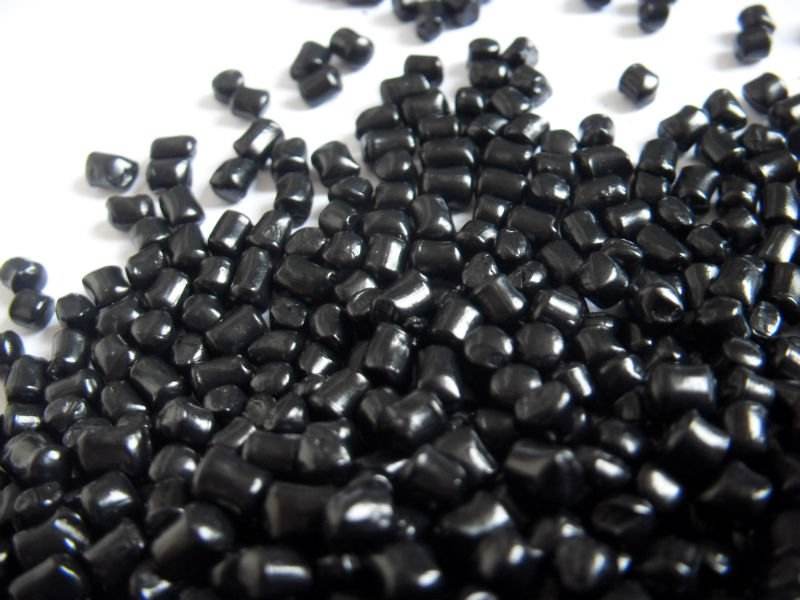What are the factors that determine the quality of black masterbatch?
The dispersion should be high
Black masterbatch is produced using carbon black. Carbon black is a very difficult to handle and dirty mixture, which is dusty, lightweight, and fluffy. Unless large-scale processing methods are used, it will dirty the machines and workers, making the working environment dirty. Because of this, foundry workers generally choose to complete the pre dispersion of carbon black on a resin carrier, which is the black masterbatch. This resin carrier is clean, flexible, and easy to use. In addition, besides being dirty, carbon black also has a characteristic of being difficult to disperse. If the raw carbon black is directly melted during injection molding, the coloring effect will be very poor. Carbon black stripes and spots without dispersion will be significantly visible when placed next to areas with less coloring. Standard injection molding machines cannot effectively disperse carbon black.
Carbon black, which is difficult to disperse, also troubles manufacturers of coloring masterbatch. The dispersion of high load black masterbatch produced by single or double screw extruders is very poor. When the user ultimately mixes or molds these black masterbatches, its function is only slightly better than carbon black, but its effect is equally unsatisfactory. To achieve a stable high degree of dispersion, it is necessary to use high-level shearing machines to mix carbon black, such as FCM or BANBURY mixtures. By utilizing sufficient strength, these mixers can completely mix carbon black and base resin together. The type of carbon black used also affects the color dispersion. The smaller the carbon black particles, the more difficult their dispersion becomes.
The application of thin wax emphasizes the requirement of dispersion. The final product of the master batch with poor dispersion can be easily seen by the naked eye from the corners. In addition to lacking aesthetic appeal, the carbon black with poor dispersion in the film significantly reduces the anti weathering function of the black film.

Strong masking power is necessary
Another factor in determining the quality of black masterbatch is masking power, which is particularly important for color masterbatches used for waste or recycled polymers. In these cases, the role of black is to mask other colors that waste guesses. The coloring ability of large particle carbon black is poor, and it is not easy to cover up all other colors in the lower layer, resulting in the product only getting deviated colors. During the melting process, correctly selecting carbon black with high coloring ability to mask the existing color is called masking power.
Good activity
The third element in determining the quality of black masterbatch is rheology and activity. If a color masterbatch itself has good dispersion, but it cannot move into the material to be molded, then the effect of production is not ideal. Generally speaking, the base resin used for producing color masterbatch has high rheological properties. In order to save costs, some color masterbatch manufacturers use reusable materials, waste materials, or recycled materials as resin carriers. The activity function of the color masterbatch produced in this way will significantly decrease. If the rheological properties are not good, the mold will encounter difficulties in cycle time and appearance treatment. It is worth noting that if the dispersion and rheological properties are not high, some users will eventually compensate by increasing the dilution ratio, but this approach will only increase the cost of using the color masterbatch. Color masterbatch with small dilution ratio can produce uniform and well dispersed black.
Greater compatibility is required
The fourth element in determining the quality of black masterbatch is compatibility. If the color masterbatch is produced using chips or recycled materials, it may contain pollutants or other non melting polymers.
Article source: Taishan conductive mica particles
-
04-11
Taishan conductive PP masterbatch: How to use defoaming masterbatch?
Defoaming masterbatch is suitable for enterprises that use PE and PP recycled plastics for product production. The trace amount of moisture contained in raw materials has a very serious impact on the
-
11-13
Characteristics and uses of conductive masterbatch plastics
Characteristics and uses of conductive masterbatch plastics1、 Characteristics of conductive masterbatch plastics:① Most plastics are lightweight, chemically stable, and will not rust;② Good impact res
-
10-13
What is PP talc powder masterbatch
What is the masterbatch of PP talc powder?PP talc powder masterbatch is a plastic modified filler, mainly composed of talc powder, which is a particle mixed with polymers or other carriers. It is main
-
08-09
Taishan Conductive Cloud Masterbatch Manufacturer Tells You Why to Use Conductive and Anti static Engineering Plastics
1. The fundamental physical properties of static electricity are:(1) Attracting or excluding;(2) There is a potential difference with the earth;(3) Discharge current will occur.These three characteris

